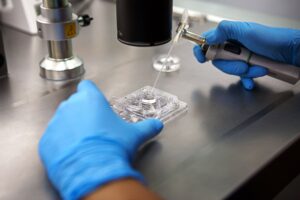Approximately 20% of couples suffer from fertility problems, most of which can be resolved with specific treatments that address the source of the problem. Egg donation is one of the solutions addressing fertility complications related to a woman’s reproductive abilities, and can be applicable to women with ovarian failure, reduced or no ovarian reserve, women over 45, women who produce poor quality embryos or eggs, women carrying a defective gene, and other conditions.
Egg donation may be appropriate for a woman aged 18 to 54 who are unable to conceive due to ovum related disease, making her a candidate to receive donated ova through a medical procedure.
Eggs may derive from a healthy woman in the 21 to 30 years age range, or a woman also undergoing fertility treatment. Eggs are retrieved from the donor, fertilized by sperm cells via the in vitro process, and the resultant embryos are then transferred to the surrogate uterus.
Egg donation begins with the very critical step of identifying the donor. This stage is vital to the procedure’s success and involves meticulously relating to medical issues, and external markers which may impact the pregnancy, such as a healthy lifestyle void of alcohol or drug consumption, smoking, and more.
EGG SHARING: It is extremely important to ensure that donated eggs is exclusive to the country of the intended parents. Once a donor has donated eggs to one surrogacy proceeding in a specific country, she will not be allowed to donate additional ova to other couples from the same country. This prevents “egg sharing” complications.
When a donor has been found, the fertilization phase begins with a hormonal procedure that encourages the donor’s reproductive system to produce a large number of eggs, from which the best are selected.
Once the eggs are retrieved from the donor’s ovaries, they are immediately transferred to the laboratory for fertilization with the biological father’s sperm. The resulting fetuses are introduced into the biological mother’s uterus using a slim catheter. This process launches the pregnancy. Usually 2 to 3 embryos are returned to the uterus. The remaining embryos are generally frozen and saved for future use.
Royal Surrogacy offers access to a comprehensive pool of charming attractive donors. We assist in selecting the right donor from our database of young women aged 18 to 28 whose medical and health backgrounds have been thoroughly reviewed. They do not smoke, are not overweight, and are fully cognizant of the process they are joining.
Donors undergo a long and comprehensive series of medical tests. All results are made available to the designated parents to ensure full transparency as you make the right choice.
- Fast and efficient procedure
- High success rates
- Adherence to comprehensive and innovative medical examinations
- Use of highest standard current technologies
- All relevant information is accessible with full transparency to you as the intended parents
- 24/7 personal guidance and customized professional assistance available to you

We are available to provide you with detailed information and offer you our vast experience and knowhow as you choose your best option. We can also assist with a sperm donation as required by providing access to relevant databases and guiding you from our cumulative experience in the field.
- A free consultation with our professional experienced team who will help direct you and answer all your questions in detail
- Access to an extensive database including photos of young healthy donors who have passed our comprehensive medical examinations
- Professional advice to support you, as the future parents, when choosing your optimal course of action
- Preparing the donor and performing the egg retrieval and fertilization process
- Developing embryos in the laboratory and transferring them into the surrogate uterus
- Freezing and preserving surplus fetuses for future pregnancies



